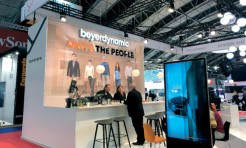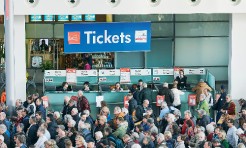Aktuelle Ausgabe
-
23.04.2024 Industry leaders gather in Kigali for the UFI Middle East & Africa Conference
The UFI Middle East & Africa Conference brought together industry leaders, professionals, and stakeholders in Kigali, Rwanda, from 15-17 April. Hosted by the Rwanda Convention Bureau at the Kigali Convention Centre.
-
17.04.2024 Exhibition World Bahrain to Host 2nd Edition of Ghedex Bahrain 2024
Exhibition World Bahrain (EWB) will be hosting the 2nd edition of the Global Higher Education Exhibition “Ghedex Bahrain” on 21-22 April 2024.
-
12.04.2024 Hong Kong: Twin lighting fairs welcomed some 16,000 buyers
Organised by the Hong Kong Trade Development Council (HKTDC), the inaugural Smart Lighting Expo and 15th Hong Kong International Lighting Fair (Spring Edition) (Spring Lighting Fair) concluded successfully.
-
09.04.2024 Finland’s largest LED wall within a conference facility at Helsinki Expo
The Helsinki Expo and Convention Centre will undergo a significant renovation in the fall of 2024. The largest facility in the Conference Centre, hall 101, will be equipped with a new LED wall.
-
03.04.2024 NürnbergMesse celebrates its 50th birthday
NürnbergMesse is celebrating its 50th anniversary – and the City of Nuremberg is celebrating along with it.
-
28.03.2024 AMR 2024 concludes with strong results
The Auto Maintenance and Repair Expo (AMR) concluded on 23 March 2024 at the National Convention and Exhibition Center (Tianjin) with strong results in terms of the exhibition area, and number of exhibitors (1.061) and visitors (45.616 visits).
-
22.03.2024 ExpoTalent supports new business initiatives
Expotalent is a foundation initiated by three experienced professionals in the expo-events industry: Gert Jan van den Nieuwenhoff (Ahoy), Ids Boersma (RAI), and Ton Otten (Jaarbeurs).
-
20.03.2024 Exhibition World Bahrain hosts 1st Media Ghabga
Exhibition World Bahrain (EWB), the award-winning World’s Leading New Exhibition and Convention Centre for the year 2023, hosted its first Ramadan Ghabga for members of the media on Tuesday, March 19, 2024.
-
15.03.2024 UFI Asia-Pacific Conference unites exhibition industry leaders in Macau
Close to 300 delegates from 20 countries and regions attended the UFI Asia-Pacific Conference in Macau. The annual event was held at The Parisian Macao and hosted by the Macau Fair & Trade Association.
-
11.03.2024 Thailand affirms commitment to green future as host of Expo 2029
The International Association of Horticultural Producers (AIPH) has approved the rights for Thailand, a registered candidate, to host the 2029 International Horticultural Expo or “Korat Expo 2029.”
-
07.03.2024 AIPH International Horticultural Expos Conference in Doha
The International Association of Horticultural Producers (AIPH) is a global organisation uniting thousands of growers of flowers and ornamental plants. It is the approving body of International Horticultural Expos, such as Expo Doha Qatar 2023.
-
04.03.2024 ITB 2024: Switch Asia to Green seminar
Sustainability is more important than ever for European tourists, and Asian destinations are increasingly harnessing this potential.
-
28.02.2024 ADIPEC to take place in November 2024 in Abu Dhabi
ADIPEC will be held in Abu Dhabi on 4-7 November 2024, advancing tangible action across the entire energy value chain, accelerating decarbonisation and advancing the global energy transformation.
-
23.02.2024 AsiaWorld-Expo signs multi-year Diamond Sponsorship Agreement with UFI
UFI, the global association of the exhibition industry, and AsiaWorld-Expo have signed a multi-year Diamond Sponsorship Agreement, underlining AsiaWorld-Expo’s commitment to the ongoing development of the exhibition industry.
-
22.02.2024 IMEX Frankfurt responds with intention to the industry’s new needs
With a global range of exhibitors, learning sessions that dig into today’s most pertinent issues and opportunities to build new connections, IMEX Frankfurt 2024 is set to be a show with impact.
-
20.02.2024 Farnborough International invests in the brand behind The British Motor Show
Farnborough Internation has purchased a 48 per cent ownership of Automotion Events, the company behind The British Motor Show, to support the brand in growing its automotive portfolio.
-
14.02.2024 MyCEB enhances Malaysia’s business industry through regional idea exchange
Malaysia Convention & Exhibition Bureau (MyCEB) has made a significant stride in its commitment to elevate the nation’s business events industry.
-
09.02.2024 AUMA: Augsburg and Freiburg the latest to become new members
Augsburger Schwabenhallen Messe- und Veranstaltungsgesellschaft and Freiburg Wirtschaft Touristik und Messe are the latest new members of AUMA – the association of the German trade fair industry.
-
06.02.2024 UFI Global Barometer indicates that the exhibition industry will grow to record levels in 2024
UFI, the global association of the exhibition industry, has released the latest 32nd edition of its flagship Global Exhibition Barometer research which takes the pulse of the industry.
-
02.02.2024 Belgian manufacturing company beMatrix wins award for best stand design
Last night, beMatrix won the award for 'Best Stand Design' in the category of stands from 30 to 69 square metres.
UFI Global Barometer provides 2020 results and 2021 perspectives for the exhibition industry
27.01.2021
UFI, the global association of the exhibition industry, has released the latest edition of its flagship Global Barometer research, which takes the pulse of the industry. Results highlight the severe impact of the Covid-19 pandemic on the exhibition industry worldwide, in 2020. There are also positive signs regarding a quick recovery in 2021.
Globally, between April and August 2020, more than half of all
companies reported no activity. This situation changed from September,
where the majority of companies declared some operations, at reduced
levels for most. Looking ahead to 2021, the share of companies
expecting a return to “normal” activity is expected to grow from 10% in
January to 37% in June. These results vary depending on region, and are primarily driven by the
“re-opening date” of exhibitions. In all regions, most companies expect
both local and national exhibitions to re-open by the end of June 2021,
with international exhibitions resuming in the second half of the year.
Company operations also include, while face-to-face events are not
possible, working into the development of digital solutions.
When asked what element would most help with the “bounce back” of
exhibitions, the majority of companies, ranked “readiness of exhibiting
companies and visitors to participate again” (64%), “lift of current
travel restrictions” (63%) and “lift of current public policies that
apply locally to exhibitions” (52%) as key factors.
Overall:
44% of companies benefitted from some level of public financial
support; for the majority this related to less than 10% of their
overall 2019 costs.
54% of companies had to reduce their workforce, with half of these by
more than 25%.
10% of companies will have to consider permanently ceasing operations
if there are no events for the next six months.
As expected, the “impact of the Covid-19 pandemic on the business” is
considered the most important business issue (stated by 29% of
companies, a 2% increase on six months ago). The “impact of digitalisation”
(11%) and “competition with other media” (7%) have also increased (+1%
and +2% respectively), while the “state of the economy in the home
market” (19%) and “global economic developments” (16%) have decreased,
but remain amongst the top three concerns. In terms of future exhibition formats, global results indicate that 64%
(compared to 57% six months ago) are confident that “Covid-19 confirms
the value of face-to-face events”, indicating an expectation that the
sector will bounce back quickly.
“The message from the global industry is clear: quite simply, 2020 was
horrible. The pandemic stopped most activities around the world for
several months, and, globally, our industry’s revenue dropped by almost
three quarters. But, as the Global Barometer shows, 2021 should see a
significant bounce back, with global revenues expected to double,
pending markets re-opening and clarity on regulations. We will ‘build
back’ even better, and while the industry will remain, primarily, a
face-to-face marketing channel, digital offers will evolve with new
patterns,” says Kai Hattendorf, UFI managing director and CEO.
Size and scope
This latest edition of UFI’s bi-annual industry survey was concluded in
December 2020, and includes data from 457 companies in 64 countries and
regions. The study also includes outlooks and analysis for 24 countries and
regions – Argentina, Australia, Brazil, China, Colombia, France,
Germany, Hong Kong, India, Italy, Japan, Malaysia, Mexico, Peru,
Russia, Singapore, South Africa, South Korea, Spain, Thailand, Turkey,
the UAE, the UK and the US – as well as an additional five aggregated
regional zones.
“We sincerely thank all companies who took part in this study. The
results from 29 markets and regions provide strong insights for
assessing both the impact of the crisis and future perspectives. We
also welcome AFEP and Unimev, who partnered with us for this edition,
resulting in our first ever specific country profiles for Peru and
France,” says Christian Druart, UFI research manager.
Operations since 2020 – reopening exhibitions
Results show that the periods when most companies reported “no
activity” in 2020 were limited to March-June for the Asia-Pacific
region, April-June for North America, and April-September for Central
and South America and the Middle East and Africa. In Europe, there was
an initial period of inactivity in April-August, followed by another
period in November-December.
Turnover – operating profits
Regional results indicate that:
The revenue drop for 2020 was the highest for companies in Central
and South America and the Middle East and Africa (who respectively only
achieved 23% and 24% of 2019 revenue levels). Companies in the
Asia-Pacific region (27% of 2019 levels), Europe (32% of 2019 levels)
and North America (36% of 2019 levels) are at or above global averages.
The 2021 perspectives are rather similar for all regions: who are
expecting to achieve between 32% and 37% of last year’s revenue for
H1-2021, and between 55% and 60% for all of 2021.
In terms of profits, the share of companies who faced a loss for 2020
varies from 47% in the Asia-Pacific region and Europe, to 50% in North
America, 58% in the Middle East and Africa, and 64% in Central and
South America.
Public financial support – workforce and perspectives
Regional results indicate that:
The number of companies receiving public financial support is higher
in Europe (54% of companies) and the Asia-Pacific region (53%), than in
Central and South America (35%), North America (31%) and the Middle East
and Africa (13%).
The share of companies forced to reduce their workforce is higher in
the Middle East and Africa (73% of companies), North America (61%) and
Central and South America (56%), than in Europe (52%) and the
Asia-Pacific region (49%).
The proportion of companies believing they will need to close if
business doesn’t resume within the next six months varies from 5% in
North America, to 6% in the Asia-Pacific region, 10% in Central and
South America, 14% in Europe and 17% in the Middle East and Africa,
while the proportion of companies who believe they will cope ranges
from 26% in Europe to 40% in the Asia-Pacific region.
Key business issues
While the “impact of the Covid-19 pandemic on the business” is the key
business issue across all regions, “global economic developments” are
ranked higher in the Middle East and Africa (23% of companies) than in
other regions. The “impact of digitisation” is ranked higher in North
America (15%) and Europe (14%) than other regions. Further insight by type of activity, for three main segments –
organisers, venues and service providers – highlights a difference in
the fourth most important issue, with organisers indicating “impact of
digitisation”, venues indicating “internal challenges” and service providers
indicating “regulatory/stakeholders’ issues”.
Future exhibition formats
The report also highlights two significant regional differences in
relation to possible trends driving the future format of exhibitions: The claim “Covid-19 confirms the value of face-to-face events” was
more widely agreed with in the Middle East and Africa (70% of
companies), the Asia-Pacific region (69%) and Europe (67%), than in
North America (55%) and Central and South America (53%). While, there were stronger opposing views for the claim “virtual
events replacing physical events”, with 74% of companies in Europe
disagreeing, compared to just 57% of companies from North America.
Background
The 26th Global Barometer survey, conducted in December
2020, provides insights from 457 companies in 64 countries and regions.
It was conducted in collaboration with 20 UFI Member Associations.
Share in Facebook, Twitter or Google+:
TFI - Trade Fairs International - The International Trade Fair Magazine.
© 2006 - 2024 by TFI-Verlagsgesellschaft mbH. All rights reserved. TFI-Verlagsgesellschaft mbH shall accept no responsibility for the contents of external links and other contents.
TFI-Know-how
-
What to do when things go wrong at virtual or in-person events?

In the event world, it’s simply part of life if things don’t work out as planned.
-
How can networking be made to work at online events?

Networking typically happens at real, in-person events. But it’s also possible to do it online; it just works a little differently. There are various options available to organisers.
-
How can exhibitors stand out at trade fairs?

New products and a well-conceived stand design are not the only drivers for a successful presence. Many other factors are also important, but trade fair planners often lose sight of them.
-
How can industry decision-makers be reached online?

Trade fairs and trade fair companies need to constantly further develop, become more agile and flexible and offer services all year round. New, digital offerings are very important here. With its TrustedTargeting technology, Messe München offers its customers access to leading business-to-business decision-makers on the Internet.


